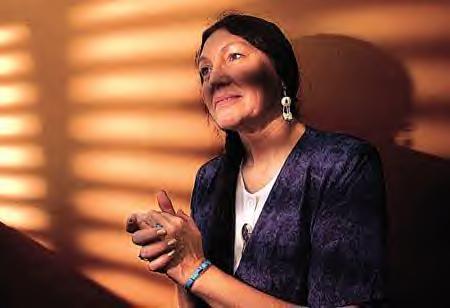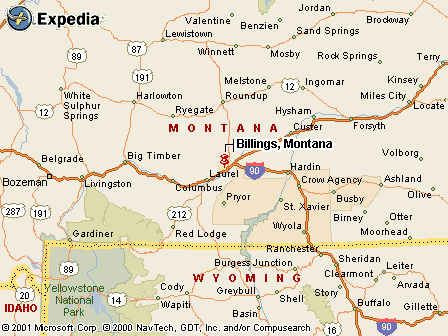|
|
Canku Ota |
|
|
(Many Paths) |
||
|
An Online Newsletter Celebrating Native America |
||
|
August 23, 2003 - Issue 94 |
||
|
|
||
|
Pease Seeks to Attract Indian Students |
||
|
by Mary Pickett Billings
Gazette
|
||
|
credits: David
Grubbs Gazette Staff
|
|
On July 1, Pease became Rocky's vice president for Native American Affairs, a new position created by college President Thomas Oates. The position is among the first of its kind at a non-tribal college in the region. Pease knows her way around Rocky, having served on the college's national advisory board. Rocky gave her an honorary doctorate degree in 1998. She also has been on the Montana Science and Technology Consortium Board of Advisors, which includes Rocky Mountain College and six of seven Montana tribal colleges. The consortium works to expand opportunities for American Indian college students majoring in mathematics, science and technology. Pease's father and uncle have degrees from Rocky, and her grandfather attended Rocky's predecessor, Billings Polytechnic Institute. Her own deep family ties to the college may be one reason she feels treating Rocky's Native American students as part of an extended family will encourage them to stay until graduation. Retention of current students and increasing the number of new Native American students at Rocky are part of Pease's new job. Last year, about 60 Native Americans attended Rocky. That number includes students working on Rocky degrees through distance-learning programs at tribal colleges and Rocky's degree-completion program. Native Americans are the largest group of minority students at Rocky, which has a total enrollment of about 800 students. While the exact responsibilities of her new job still are developing, Oates has talked with Pease about some changes he'd like to see on campus to benefit Native American students. "Dr. Oates has a wonderful sense of vision for American Indian students at Rocky," she said. Rocky already has a lot to offer Native American students, including small classes, approachable faculty and fields of study that fit well with students transferring from tribal colleges, such as education, natural-resources management and information technology. Natural-resource-management students can become interns with federal agencies, such as the U.S. Department of Energy at its Los Alamos and Sandia labs in New Mexico. "It's a tremendous opportunity for students to work at the elbow of a doctoral scientist," Pease said. Still, more can be done to encourage Native Americans to come to Rocky. Pease will be looking at the curriculum to see how courses can be made more relevant to Indian students. A Native American student majoring in economics, for example, could learn about tribal economics. Pease also will look at student services that encourage or discourage Native American students from continuing their education at Rocky. Because Native American students tend to be older than other Rocky students and many have families, student activities designed for 18-year-olds don't attract them. Pease would like to see more events that welcome families and spouses, such as potluck dinners followed by discussions of issues with tribal leaders. At the same time, Oates wants Native American students to join the full range of campus offerings from outdoor activities to study in foreign countries. As important as it is improve programs that benefit Native American students, having them on campus benefits Rocky, too. Most Rocky students come from communities with few or no minorities. Increasing the number of Native American and foreign students helps all students learn how to live in a diverse society, Pease said. She also will teach a class in Native American studies. "That's a thrill," she said. Pease has bachelor's degrees in both anthropology and sociology from Central Washington University and a master's degree and a Ph.D. in adult and higher education from Montana State University. She was the founding president of Little Big Horn College on the Crow Reservation from 1982 to 2001. Pease left following a lengthy battle with tribal officials who asserted control over the college. Since then, she has worked as a consultant in her own firm, which specialized in program development, educational research and strategic planning for tribal colleges and universities as well as for the American Indian College Fund and the American Indian Higher Education Consortium. |
|
|
www.expedia.com |
|
|
||
|
|
||
| Canku Ota is a free Newsletter celebrating Native America, its traditions and accomplishments . We do not provide subscriber or visitor names to anyone. Some articles presented in Canku Ota may contain copyright material. We have received appropriate permissions for republishing any articles. Material appearing here is distributed without profit or monetary gain to those who have expressed an interest. This is in accordance with Title 17 U.S.C. Section 107. | ||
|
Canku Ota is a copyright © 2000, 2001, 2002, 2003 of Vicki Lockard and Paul Barry. |
||
 |
 |
|
|
The "Canku Ota - A Newsletter Celebrating Native America" web site and its design is the |
||
|
Copyright © 1999, 2000, 2001, 2002, 2003 of Paul C. Barry. |
||
|
All Rights Reserved. |
||
 Janine
Pease started a new job last month at Rocky Mountain College,
but she is no stranger to the campus.
Janine
Pease started a new job last month at Rocky Mountain College,
but she is no stranger to the campus. 